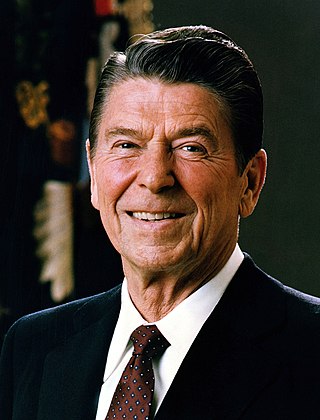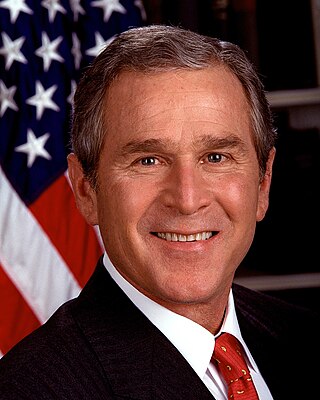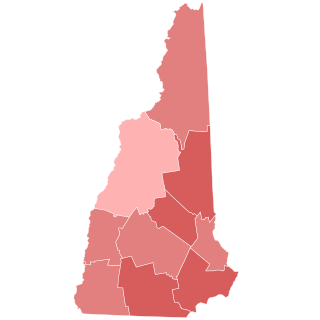Related Research Articles

The 1996 United States presidential election was the 53rd quadrennial presidential election, held on Tuesday, November 5, 1996. Incumbent Democratic President Bill Clinton defeated former Senate Majority Leader Bob Dole, the Republican nominee, and Ross Perot, the Reform Party nominee and 1992 presidential candidate.

The 1988 United States presidential election was the 51st quadrennial presidential election held on Tuesday, November 8, 1988. The Republican nominee, incumbent Vice President George H. W. Bush, defeated the Democratic nominee, Governor Michael Dukakis of Massachusetts. It was the first presidential election since 1948, and the most recent to date, in which a party won more than two consecutive presidential terms. It remains the most recent election in which a candidate won over 400 electoral votes. Additionally, it was the last time that the Republicans won the popular vote three times in a row. Conversely, it began an ongoing streak of presidential elections that were decided by a single-digit popular vote margin. It was also the first, and only election to date, in which one of the two major presidential candidates was not of Northern European ancestry.

Robert Joseph Dole was an American politician and attorney who represented Kansas in the United States Senate from 1969 to 1996. He was the Republican Leader of the Senate during the final 11 years of his tenure, including three non-consecutive years as Senate Majority Leader. Prior to his 27 years in the Senate, he served in the United States House of Representatives from 1961 to 1969. Dole was also the Republican presidential nominee in the 1996 election and the vice presidential nominee in the 1976 election.

The presidential primary elections and caucuses held in the various states, the District of Columbia, and territories of the United States form part of the nominating process of candidates for United States presidential elections. The United States Constitution has never specified the process; political parties have developed their own procedures over time. Some states hold only primary elections, some hold only caucuses, and others use a combination of both. These primaries and caucuses are staggered, generally beginning sometime in January or February, and ending about mid-June before the general election in November. State and local governments run the primary elections, while caucuses are private events that are directly run by the political parties themselves. A state's primary election or caucus is usually an indirect election: instead of voters directly selecting a particular person running for president, they determine the number of delegates each party's national convention will receive from their respective state. These delegates then in turn select their party's presidential nominee. The first state in the United States to hold its presidential primary was North Dakota in 1912, following on Oregon's successful implementation of its system in 1910.

Mary Elizabeth Alexander Hanford Dole is an American attorney, author, and politician who served as a United States Senator from North Carolina from 2003 to 2009. A member of the Republican Party, she previously served in five presidential administrations, including as U.S. Secretary of Transportation under President Ronald Reagan from 1983 to 1987 and as U.S. Secretary of Labor under Reagan's successor, George H. W. Bush, from 1989 until 1990. Dole then left government to serve as president of the American Red Cross from 1991 to 1999; she departed from that position to seek the Republican nomination in the 2000 presidential election but eventually withdrew from the race.

The 2000 presidential campaign of George W. Bush, then governor of Texas, was formally launched on June 14, 1999 as Governor Bush, the eldest son of former President George H. W. Bush, announced his intention to seek the Republican Party nomination for the presidency of the United States in the 2000 presidential election.
The Log Cabin Republicans (LCR) is an organization affiliated with the Republican Party which advocates for equal rights for LGBT+ Americans.

The 2002 New Hampshire Senate election phone jamming scandal involved the use of a telemarketing firm hired by that state's Republican Party (NHGOP) for election tampering. The tampering involved using a call center to jam the phone lines of a get out the vote (GOTV) operation. In the end, 900 calls were made for 45 minutes of disruption to the Democratic-leaning call centers.
Progress for America (PFA) and its affiliate Progress for America Voter Fund (PFA-VF) are national tax-exempt organizations in the United States. PFA was established in 2001 to support George W. Bush's "agenda for America". The PFA Voter Fund, which was set up in 2004, raised US$38 million in support of Bush's 2004 election bid.

From January 21 to June 3, 1980, voters of the Republican Party chose its nominee for president in the 1980 United States presidential election. Retired Hollywood actor and two-term California governor Ronald Reagan was selected as the nominee through a series of primary elections and caucuses culminating in the Republican National Convention held from July 14 to July 17, 1980, in Detroit, Michigan.

From January 14 to June 14, 1988, Republican voters chose their nominee for president in the 1988 United States presidential election. Incumbent Vice President George H. W. Bush was selected as the nominee through a series of primary elections and caucuses culminating in the 1988 Republican National Convention held from August 15 to August 18, 1988, in New Orleans, Louisiana.

From January 29 to June 4, 1996, voters of the Republican Party chose its nominee for president in the 1996 United States presidential election. Senator Bob Dole of Kansas, the former Senate majority leader, was selected as the nominee through a series of primary elections and caucuses culminating in the 1996 Republican National Convention held from August 12 to 15, 1996, in San Diego, California; Dole resigned from the Senate in June 1996 once he became the presumptive nominee to concentrate on his presidential campaign.

From January 24 to June 6, 2000, voters of the Republican Party chose its nominee for president in the 2000 United States presidential election. Texas Governor George W. Bush was selected as the nominee through a series of primary elections and caucuses culminating in the 2000 Republican National Convention held from July 31 to August 3, 2000, in Philadelphia, Pennsylvania.

Richard H. Davis, Jr. is an American political consultant. He previously served as a partner and chief operating officer of Pegasus Capital Advisors L.P., a private equity firm specializing in sustainable development projects. He was a managing partner of the business development and public affairs consulting firm Davis-Manafort, located in Alexandria, Virginia. He was the national campaign manager of John McCain's 2008 presidential campaign. In that capacity, he oversaw the development and implementation of all campaign strategy and policy development. Davis also served McCain as national campaign manager for his 2000 presidential campaign.

The 2010 United States Senate election in New Hampshire was held on November 2, 2010, alongside other midterm elections to the United States Senate in other states as well as to the United States House of Representatives. A primary election was held on September 14. Incumbent Republican U.S. Senator Judd Gregg decided to retire instead of seeking a fourth term. Republican nominee Kelly Ayotte won the open seat by over 23 points.

The 1988 presidential campaign of George H. W. Bush, the 43rd vice president of the United States under President Ronald Reagan, began when he announced he was running for the Republican Party's nomination in the 1988 U.S. presidential election on October 13, 1987. Bush won the 1988 election against Democratic nominee Michael Dukakis on November 8, 1988. He was subsequently inaugurated as president on January 20, 1989.
Since 1980, the Republican Party of the United States has held debates between candidates for the Republican nomination in presidential elections during the primary election season. Unlike debates between party-nominated candidates, which have been organized by the bi-partisan Commission on Presidential Debates since 1988, debates between candidates for party nomination are organized by mass media outlets.

In New Hampshire, the communities of Dixville Notch, Hart's Location, and Millsfield all vote at the midnight beginning election day, known as the New Hampshire midnight votes, on the day of the state's political party primaries and general elections, following a tradition that started to accommodate railroad workers who had to be at work before normal voting hours. The voting tradition has been followed in Dixville Notch since the 1960 presidential election, in Hart's Location from 1948 to 1964 and since 1996, and in Millsfield since 2016.
References
- 1 2 "New Foundation Board Leadership". University of New Hampshire . Retrieved February 3, 2020.
- ↑ Robert Braile, "Education secretary speaker at UNH rite", The Boston Globe (May 26, 1991), p. 65.
- ↑ "'No tax' is Lamontagne gubernatorial theme", Brattleboro Reformer (April 12, 1996), p. 2.
- ↑ Mary McGrory, "Plotting an upset in New Hampshire", The Boston Globe (August 3, 1996), p. 11.
- 1 2 3 4 5 6 Kathleen Hall Jamieson, Electing the President, 2004: The Insiders' View (2011), p. 175.
- ↑ Shirley Elder, "Political camp workers go wherever the action's hottest", The Boston Globe (February 18, 1996), p. 11.
- ↑ Ann Scales, "In Iowa, Forbes zeros in on Dole", The Boston Globe (February 3, 1996), p. 6.
- 1 2 3 Dennis W. Johnson, Democracy for Hire: A History of American Political Consulting, (2016), p. 467.
- ↑ Michael J. Malbin, The Election After Reform: Money, Politics, and the Bipartisan Campaign (2006), p. 88.
- ↑ Richard M. Skinner, More Than Money: Interest Group Action in Congressional Elections (2007), p. 147.
- ↑ The Institute of Politics, John F. Kennedy School of Government. Campaign for President: The Managers Look at 2004 (2006), p. 218.
- ↑ "Democrats master art of 527s but GOP rallies". The Washington Times . August 26, 2004.
- ↑ "CAMPAIGN 2004 DONATIONS: GOP contributors use loophole – just like Dems". San Francisco Chronicle. October 20, 2004.
- ↑ "Weekly Report Sept. 26–30", CQ Weekly, Volume 63 (2005), p. 2652.
- ↑ Newsweek, Volumes 146-147 (2005), p. 79.
- ↑ Justice, Glen; Pilhofer, Aron (November 14, 2005). "Unwavering Bush Ally ActsQuickly on Court Choices". The New York Times .
- ↑ "Brooks School Board of Trustees". Brooks School . Retrieved February 3, 2020.